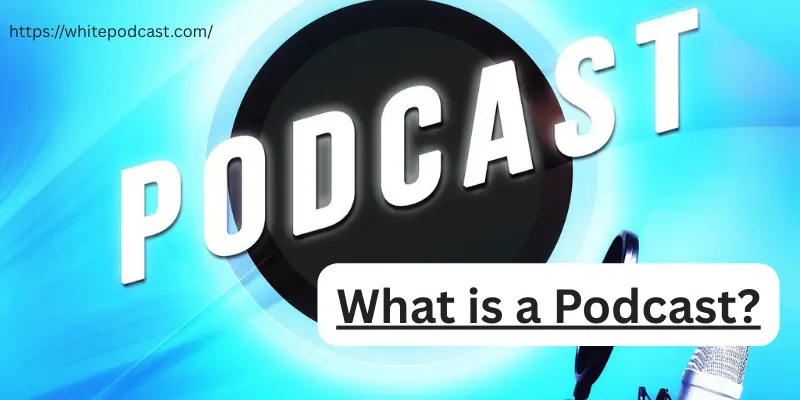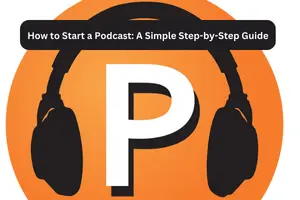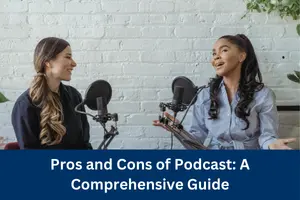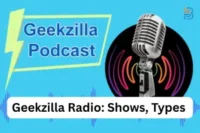What Is a Podcast? Complete Guide — Definition, Tips & Steps
Published: 14 Sep 2024
A podcast is a digital audio program, similar to an on-demand radio show, that you can stream or download at any time through apps like Spotify, Apple Podcasts, and Google Podcasts.
Imagine listening to a show whenever you want—whether you’re commuting, working out, or just relaxing at home. That’s what podcasts are all about! A podcast is an audio program you can stream or download,

What is a Podcast?
A podcast is a digital audio program, similar to an on-demand radio show, that you can stream or download anytime. Podcasts are usually released in episodes and cover a wide range of topics like news, comedy, education, business, lifestyle, or storytelling. Unlike traditional radio, you don’t have to tune in at a fixed time—you choose when and where to listen, making podcasts a flexible and modern way to consume content.
Podcast Examples
Understanding real podcast examples helps beginners see how different styles, topics, and formats work. Podcasts come in many categories—news, business, education, storytelling, comedy, and more—giving listeners endless choices. Below are some popular and easy-to-understand podcast examples that showcase how flexible and creative this audio format can be.
🔹 Serial
A true-crime storytelling podcast that follows one case across multiple episodes. It is one of the best podcast examples for narrative-style audio.
🔹 The Daily
A short, daily news podcast by The New York Times. It explains major events in simple language, making it perfect for quick learning.
🔹 The Joe Rogan Experience
A long-form interview podcast featuring guests from different fields—celebrities, scientists, athletes, authors, and more.
🔹 Stuff You Should Know
An educational podcast that breaks down everyday topics in a fun and easy way. Great for curious listeners.
🔹 Huberman Lab
A science and health podcast that teaches practical tips on sleep, focus, hormones, and motivation.
Who Invented Podcasts?
The concept of podcasts is credited to Ben Hammersley, a British journalist who first used the word “podcasting” in a 2004 article for The Guardian. Around the same time, Dave Winer, a software developer, and Adam Curry, a former MTV host, played a key role in developing the technology that made podcasting possible.
They created a way to attach audio files to RSS feeds, allowing people to automatically download episodes to their devices. This innovation laid the foundation for podcasts as we know them today.
In simple terms, Hammersley gave podcasts their name, while Winer and Curry gave them their working system. Together, they turned a clever idea into a new era of on-demand audio.
Podcast Meaning
A podcast is an audio-based show available on the internet that listeners can stream or download. It works like a radio show, but you can listen whenever you want, without following a fixed schedule.
Podcasts are usually released in episodes and can cover countless topics such as education, lifestyle, business, technology, motivation, news, and entertainment. Many podcasts also feature interviews, storytelling, or expert discussions, making them a flexible and engaging form of digital audio content.
History and Origin of Podcasts
The word podcast combines “iPod” (Apple’s popular music device) and “broadcast.” The term was first coined in 2004 by journalist Ben Hammersley. Early podcasts were often hobbyist projects, but they quickly grew into a global medium. By the late 2000s, platforms like iTunes made podcasts more accessible, and today, millions of podcasts are available on apps such as Spotify, Apple Podcasts, and Google Podcasts. Prevent Podfade: Smart Strategies for Podcast
How Do Podcasts Work?
Podcasts work through RSS feeds. When creators upload an episode to a hosting platform like Buzzsprout or Anchor, the RSS feed automatically distributes it to major podcast directories. As a listener, you simply subscribe to a podcast, and new episodes appear in your app. You can either stream them instantly or download them for offline listening. This system ensures that creators publish once, and listeners everywhere can access the latest episodes effortlessly.
Types of Podcasts (With Examples)
- Podcasts come in many formats, including:
- Interview Podcasts – A host interviews guests (e.g., The Joe Rogan Experience).
- Solo Podcasts – A single host shares thoughts or teaches (e.g., The Daily Stoic).
- Storytelling & Narrative Podcasts – Immersive stories, fiction or nonfiction (e.g., Serial).
- Panel Podcasts – Multiple hosts or experts discuss a topic (e.g., The FiveThirtyEight Politics Podcast).
- Educational Podcasts – Focused on learning and growth (e.g., Stuff You Should Know).
- This variety makes podcasts appealing to audiences with different interests and goals. types of interview podcast
Solo or Monologue Podcasts
Solo or monologue podcasts feature a single host sharing their thoughts, stories, or expertise directly with listeners. They are simple to produce, highly personal, and allow the host to build a strong one-on-one connection with the audience.
- 🎤 One host, no guests
- 🧠 Great for personal branding and expertise
- ⚡ Easy to produce and manage
- 🎯 Focused content without interruptions
- 🤝 Builds direct connection with listeners
Podcast vs Radio (Comparison)
- Feature Podcast Radio
- Availability On-demand, anytime Live, scheduled times
- Content Niche & diverse topics Broad, general programming
- Access Internet-based apps/platforms Traditional AM/FM signals
- Episodes Released in series & archived Usually not archived
- Control Listener chooses what to play Station controls content
- Benefits of Podcasts.
Why Podcasts Are More Flexible
Podcasts outshine traditional radio because they are on-demand, versatile, and lifestyle-friendly. Unlike radio, which requires tuning in at a fixed time, podcasts let you listen anywhere, anytime, and on any topic that interests you.
- 🎧 Listen on-demand — pause, rewind, or replay anytime
- 🗂 Access full archives of past episodes
- 🎙 Wide variety of topics beyond mainstream radio
- 🕒 Fits your personal schedule and daily routine
- 📱 Available on multiple apps and devices
Podcasts offer several advantages:
- Flexibility – Listen anytime, anywhere.
- Free Content – Most podcasts cost nothing.
- Educational – Learn new skills, languages, or ideas.
- Entertainment – Comedy, stories, and engaging conversations.
- Multitasking Friendly – Enjoy while commuting, working out, or cooking.
- This makes podcasts an accessible medium for both fun and personal development.
How to Listen to Podcasts
- Listening to a podcast is simple:
- Download a Podcast App – Spotify, Apple Podcasts, or Google Podcasts.
- Search for Topics or Shows – Use keywords or browse categories.
- Subscribe to a Podcast – Stay updated with new episodes automatically.
- Stream or Download – Stream instantly or save for offline listening.
- Enjoy Anywhere – On your phone, tablet, or computer.
How to Start a Podcast (Step by Step Guide)
- If you want to create your own podcast:
- Choose a Niche & Audience – Define your target listeners.
- Plan Your Format – Interview, solo, co-hosted, or storytelling.
- Get Equipment – A good microphone, headphones, and editing software.
- Record & Edit – Use tools like Audacity or Adobe Audition.
- Brand Your Show – Create a unique name and cover art.
- Select a Hosting Platform – Buzzsprout, Anchor, or Libsyn.
- Publish & Distribute – Share via Spotify, Apple, Google, etc.
- Promote Your Podcast – Use social media, blogs, or YouTube.
Choosing Your Podcast Niche
Selecting the right niche is the foundation of a successful podcast. A clear niche helps you target the right audience, stand out in a crowded market, and create consistent, engaging content that matches listeners’ interests.
- 🎯 Focus on a specific topic or theme
- 👥 Define your target audience clearly
- 📈 Easier to grow and build loyalty
- 🧩 Creates consistency in content style
- 🌟 Helps you stand out from competitors
Why Podcasts Are Becoming So Popular
Podcasts are growing worldwide because people want easy, flexible, and screen-free content. They fit into busy lifestyles and give listeners control over what they want to learn, hear, or enjoy.
⭐ Key Reasons (Bullets)
- On-demand listening anytime
- No screen needed — perfect for multitasking
- Massive variety of topics & genres
- Free access for almost everyone
- Short and long episodes available
- Easy to follow favorite creators
- Global access through apps
- More influencers launching podcasts
- High-quality storytelling formats
- People prefer audio during routines
Popular Podcast Examples (Beginner-Friendly List)
Here are some well-known podcasts that help readers understand what podcast content looks like.
🎧 Examples
- The Joe Rogan Experience – Interviews & conversations
- Serial – True crime storytelling
- The Daily – News & updates
- Stuff You Should Know – Education & fun learning
- Diary of a CEO – Business & life advice
- Call Her Daddy – Lifestyle & relationships
- Huberman Lab – Science & human behavior
- Planet Money – Finance made simple
Podcast Equipment Checklist
To start a podcast, you don’t need expensive gear. A simple setup is enough for beginners, and you can upgrade later as your show grows.
✅ Equipment Checklist
- USB Microphone (Blue Yeti, Fifine, Shure MV7)
- Headphones (Closed-back type)
- Pop filter / windscreen
- Mic stand or boom arm
- Laptop or phone for recording
- Recording software (Audacity, GarageBand, Adobe Audition)
- Quiet space for clean sound
- Basic soundproofing (optional)
Common Podcast Terms (Easy for Beginners)
Understanding basic podcast terms helps you sound confident and professional.
📘 Key Terms Explained
- RSS Feed – The link that sends your podcast to apps
- Host (Platform) – Where your podcast files are stored
- Directory – Spotify / Apple where listeners find your show
- Show Notes – Description + links for each episode
- Episode Trailer – Short intro episode
- Niche – Topic or theme of your podcast
- Outro – Ending message or closing
Tips to Grow Your Podcast Audience
- Be consistent with episode uploads.
- Use SEO-friendly titles and descriptions.
- Invite guest speakers to widen reach.
- Share snippets on social media.
- Encourage reviews and ratings on podcast platforms.
- Network with other podcasters for cross-promotion.
Here are five advantages of podcasts:
🎧 On-Demand Access – Listen whenever and wherever you want.
🗂 Wide Variety of Topics – From news and education to comedy and storytelling.
🕒 Fits Any Schedule – Perfect for commuting, exercising, or multitasking.
💸 Mostly Free – The majority of podcasts cost nothing to enjoy.
🤝 Personal Connection – Hosts often build a strong bond with their audie
Final Thoughts
In 2024, podcasting continues to grow, offering endless opportunities for creators to connect with global audiences. By focusing on quality content, consistency, and engagement, you can build a successful podcast that resonates with listeners. what is a podcast complete guide step by step & tips
- Convenient: Listen anytime, anywhere, even while multitasking.
- Varied Content: Covers a wide range of topics and interests.
- Free Access: Most podcasts are available at no cost.
- On-Demand: Available whenever you want, unlike scheduled radio shows.
- Cost-Effective: Inexpensive to produce and distribute. what is a podcast best guide step by step& tips 2024
- Global Reach: Easily accessible on multiple platforms.
- Engaged Audience: Builds a loyal listener base and offers monetization opportunities.
1.Limited accessibility for those with hearing impairments or poor internet access
2.Information overload, as there are too many podcasts to choose from.
3 They lack interactivity, preventing real-time engagement with the audience
4.Podcasts can be time-consuming to produce and edit.
5 Finding specific information in a long audio file can be challenging without proper indexing.
what is a podcast complete guide step by step & tips
https://whitepodcast.com
Proudly powered by WordPress

- Be Respectful
- Stay Relevant
- Stay Positive
- True Feedback
- Encourage Discussion
- Avoid Spamming
- No Fake News
- Don't Copy-Paste
- No Personal Attacks

- Be Respectful
- Stay Relevant
- Stay Positive
- True Feedback
- Encourage Discussion
- Avoid Spamming
- No Fake News
- Don't Copy-Paste
- No Personal Attacks





